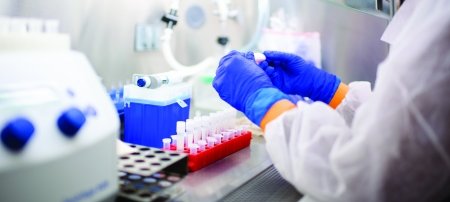As healthcare’s place in the economy expands and Michigan Tech’s involvement in the health sciences increases, the University’s Career Services office partners with Tech’s Departments of Biological Sciences, Kinesiology and Integrative Physiology, and Biomedical Engineering to bring Medical Careers Week to students.
“We want to give students the chance to explore the wide range of opportunities in healthcare,” explains Shelley Farrey, coordinator of career development and corporate event promotions in Career Services.
The focus of Medical Careers Week shifted from day to day, from biotechnology to medical devices to the health care professions.
At a Biotechnology in Healthcare round-table, students learned how biotechnology is developed and used across the healthcare spectrum from researchers who study cancer metabolism, develop vaccines and create powerful new tools in the burgeoning field of bioinformatics.
During two Health Professionals Days, students participated in a medical school preparation session and a speed networking discussion with medical professionals from a variety of disciplines, as well as practicing allied health professionals. The allied health professions make up 60 percent of the healthcare workforce.
“Getting to network with those currently in the health profession outside of just shadowing was a great way to continue building my communication skills,” says Cassie Cecchettini, a fourth-year biological sciences major in pre-med. “Being put at a table and told to ask as many questions as you can is one thing, but when it only takes one question to start a conversation, it feels much more personal and meaningful.”
"Students who know that they want to go into the health field but have not decided exactly what they want to do yet have the opportunity to meet with a variety of professionals in different areas of health."
At a Medical Device Expo, students got a hands-on look at some of the latest medical device innovations. They also had a chance to chat with representatives of leading medical device companies, including Boston Scientific, Plexus, Delphinus Medical Technologies, Phillips-Medisize, MPI Research and Teleflex Medical.
“For me, Medical Careers Week was extremely informative and allowed me interact with multiple professionals face-to-face,” says Dominique Aleo, a third-year biological sciences major with a pre-health concentration. ”It was an opportunity to learn about different professions and their day-to-day lives in the medical field, as well as receive insider knowledge about applications and medical schools.”
It’s not just students who gain from Medical Careers Week. Companies that participate benefit too. Sharon Attaway, associate director of employer relations in Michigan Tech Career Services, explains: “From the employers' perspective, the Medical Device Expo is a great opportunity for companies to promote what they do as well as highlight career pathways in a way that connects them directly to biomedical engineering students.”
Nicole Seigneurie, health professions coordinator for the College of Sciences and Arts, calls Medical Careers Week a vital experience for students interested in the health professions.
“I think that this day is really important for our students because not only does it allow them to network and meet individuals who are in the career they aspire to be in one day, but it also takes place in a very informal, comfortable environment,” says Seugneurie. “I believe this helps students feel more confident in starting conversations and asking questions while also having fun.”
This year’s Medical Careers Week—January 29 to February 1—was the fourth time Career Services has hosted the event.
Michigan Technological University is an R1 public research university founded in 1885 in Houghton, and is home to nearly 7,500 students from more than 60 countries around the world. Consistently ranked among the best universities in the country for return on investment, Michigan's flagship technological university offers more than 185 undergraduate and graduate degree programs in science and technology, engineering, computing, forestry, business, health professions, humanities, mathematics, social sciences, and the arts. The rural campus is situated just miles from Lake Superior in Michigan's Upper Peninsula, offering year-round opportunities for outdoor adventure.






Comments